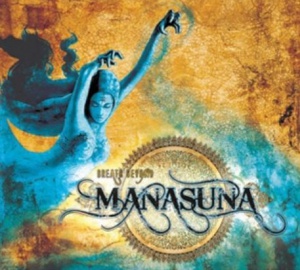Manasuna - Breath Beyond

Reads: 3001 times
90%
One of the highlights in my childhood was reading of excellent lecture "Klechdy Sezamowe" by Bolesław Leśmian. I was reading subsequent stories, captivated by realities full of geniuses, jinns and other spirits, visions of buildings with shimmering ivory in the sands of Arabia. After many years that climate, this specific mysterious Orient fantasy allowed me to feel the debut album of Polish Manasuna formation, titled "Breath Beyond".
Six men created extremely colorful music, and although tracks do not have words, formally they do not tell any particular story, by means of constituent sounds the sextet passes remarkable story from fairy tale like, disguised under appearance of reality world. Twelve hands are holding a prism, through which they let in another notes, shining with incredible colors of the rainbow. But if "rainbow" is a good word here, since the material was recorded with use of over 30 instruments? That is rather a magical blaze, which in the mind of the listeners creates material, floating in the other spaces flying carpet.
Manasuna is unique project, at least for Polish yard, but it is also difficult to look beyond the borders for a band, which in such relentless and determined manner creates the perfect synergy of various, seemingly contradict elements. As the first in their country, they managed to create a perfect symbiosis of ethnic music with oriental regions, electronic and classical music. To decide on this direction of their work, you need to be self-confident, have a specific sensibility and imagination and undoubtedly talent. The group members lack none of these factors and thus, using Turkish, Indian, Persian, and many more influences, combining them with modernity and instruments associated with European culture, they did not get lost in any of the tracks along the way, while they recorded with all of its internal diversity extremely consistent album - and, for me personally, one of the strongest music releases in 2012 in general, not to mention neofolk/ethnic/world music category, because there, they are the greatest discovery.
For decency it would be good to name a few instruments, which Manasuna’s members use. These are, for example, Australian didgeridoo, Persian santur, sitar from India, djembe, futujara, rabab, chordofon from Armenia and Uzbekistan. Whole is completed by cello and violin parties, and all is filled with modern electronics. Contrast, but contrast of a complementation itself, musical yin and yang. In addition, a blend with tradition reinforces the use of throat singing.
To the album introduces "Intro", a little disturbing, mesmerizing, trance like, thanks to, among others, didgeridoo, but just the first notes of "Monsoon Approaching" allow you to feel hot and dense air of the Orient. Chill out beginning escalates over time in a dynamic track, just as monsoon gains strength, using the pressure difference between sea and land - the essence of the formation is after all, creating a connection between the extremes. In melancholic "Into the Space Behind" particular parts of instruments either explode at full power, or go silent, seducing with amazing notes of soloists. Particularly noteworthy is the sound of string instruments - also in "Exile" with a warmer atmosphere, which delights by intriguing interplay of lush electronics, beats and old instruments. In journey to harem by the sands in a company of Bedouins invites wail of dancer-courtesan in "The Desert Flower". "Breath Beyond" kicks off slowly, but it only intensifies the satisfaction of broad sound that it offers. Almost mystical, it takes on a trip to places rooted in perception, where gods take the position of finest asanas. "Rabab of the Raja" allows you to feel warm atmosphere of Indian city, and "Six Winds" is another metaphysical trip to distant spaces of imagination. Elevates from it standing out from the rest of material, jovial "Holi", taking its name from the Hindu rites in memorial of spring and joy. Oneiric "Outro" with oriental sounds of street in the background completes the album.
About the monsoon’s strength you do not have to talk a lot. Just imagine, however, how it could increase its power, when it would come not from one, but from three sides of the horizon. Polish Manasuna group has it, joining in one three different musical worlds.
Album will appeal both to fans of chill out, ethnic sounds and bands such as Theodor Bastard and Dead Can Dance. I would not recommend it only for those, who suffer from Stendhal’s syndrome. For them: beware!
Tracklist:
01. Intro
02. Monsoon Approaching
03. Into the Space Behind
04. Exile
05. The Desert Flower
06. Breath Beyond
07. Rabab of the Raja
08. Six Winds
09. Holi
10. Outro
Six men created extremely colorful music, and although tracks do not have words, formally they do not tell any particular story, by means of constituent sounds the sextet passes remarkable story from fairy tale like, disguised under appearance of reality world. Twelve hands are holding a prism, through which they let in another notes, shining with incredible colors of the rainbow. But if "rainbow" is a good word here, since the material was recorded with use of over 30 instruments? That is rather a magical blaze, which in the mind of the listeners creates material, floating in the other spaces flying carpet.
Manasuna is unique project, at least for Polish yard, but it is also difficult to look beyond the borders for a band, which in such relentless and determined manner creates the perfect synergy of various, seemingly contradict elements. As the first in their country, they managed to create a perfect symbiosis of ethnic music with oriental regions, electronic and classical music. To decide on this direction of their work, you need to be self-confident, have a specific sensibility and imagination and undoubtedly talent. The group members lack none of these factors and thus, using Turkish, Indian, Persian, and many more influences, combining them with modernity and instruments associated with European culture, they did not get lost in any of the tracks along the way, while they recorded with all of its internal diversity extremely consistent album - and, for me personally, one of the strongest music releases in 2012 in general, not to mention neofolk/ethnic/world music category, because there, they are the greatest discovery.
For decency it would be good to name a few instruments, which Manasuna’s members use. These are, for example, Australian didgeridoo, Persian santur, sitar from India, djembe, futujara, rabab, chordofon from Armenia and Uzbekistan. Whole is completed by cello and violin parties, and all is filled with modern electronics. Contrast, but contrast of a complementation itself, musical yin and yang. In addition, a blend with tradition reinforces the use of throat singing.
To the album introduces "Intro", a little disturbing, mesmerizing, trance like, thanks to, among others, didgeridoo, but just the first notes of "Monsoon Approaching" allow you to feel hot and dense air of the Orient. Chill out beginning escalates over time in a dynamic track, just as monsoon gains strength, using the pressure difference between sea and land - the essence of the formation is after all, creating a connection between the extremes. In melancholic "Into the Space Behind" particular parts of instruments either explode at full power, or go silent, seducing with amazing notes of soloists. Particularly noteworthy is the sound of string instruments - also in "Exile" with a warmer atmosphere, which delights by intriguing interplay of lush electronics, beats and old instruments. In journey to harem by the sands in a company of Bedouins invites wail of dancer-courtesan in "The Desert Flower". "Breath Beyond" kicks off slowly, but it only intensifies the satisfaction of broad sound that it offers. Almost mystical, it takes on a trip to places rooted in perception, where gods take the position of finest asanas. "Rabab of the Raja" allows you to feel warm atmosphere of Indian city, and "Six Winds" is another metaphysical trip to distant spaces of imagination. Elevates from it standing out from the rest of material, jovial "Holi", taking its name from the Hindu rites in memorial of spring and joy. Oneiric "Outro" with oriental sounds of street in the background completes the album.
About the monsoon’s strength you do not have to talk a lot. Just imagine, however, how it could increase its power, when it would come not from one, but from three sides of the horizon. Polish Manasuna group has it, joining in one three different musical worlds.
Album will appeal both to fans of chill out, ethnic sounds and bands such as Theodor Bastard and Dead Can Dance. I would not recommend it only for those, who suffer from Stendhal’s syndrome. For them: beware!
Tracklist:
01. Intro
02. Monsoon Approaching
03. Into the Space Behind
04. Exile
05. The Desert Flower
06. Breath Beyond
07. Rabab of the Raja
08. Six Winds
09. Holi
10. Outro
